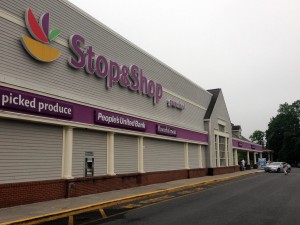Westchester grocery stores experience a second renaissance
Around the turn of the millennium, long before there were self-checkout lines or in-store deli ordering kiosks, many residents of Westchester County had to search far and wide for their bread and milk.
Grocery stores, especially in the county”™s northern sector, were sparse and often required a 15-minute-plus drive.
Westchester was clamoring for a supermarket rejuvenation, and it got one.Stop & Shop in North White Plains. Photo by Evan Fallor
Stew Leonard”™s, already with two successful locations in Fairfield County, brought its singing cows and finer food and wine to a 120,000-square-foot location in Yonkers in September 1999. Turco”™s, a Hartsdale specialty market, opened a larger, second 38,000-square-foot location in Yorktown Heights the following year.
Grand Union, a then New Jersey-based store with several locations in Westchester at the time, filed for bankruptcy in 2000 and sold off its properties to Massachusetts-based chain Stop & Shop, with the company eventually opening a mix of its standard and “superstore” locations in the lower half of the county.
That collection of megastores became the dominant face of the county”™s grocery retail industry for a number of years. But in the past decade, they”™ve been joined by a number of other national chains that are contributing to a second mini-renaissance.
Burt P. Flickinger III, managing director of Strategic Resource Group, a New York City-based consumer business consulting firm, said that chains such as ShopRite and Whole Foods Market have penetrated the Westchester market with great success, even seeing some of their highest-volume stores in the county.
“The best growth in Westchester we”™ve seen has been from the entrepreneurial, independent owner-operators,” Flickinger said, also citing Stew Leonard”™s.
Whole Foods, now in its 24th year of being a public company, has only reached roughly half of its potential in the county, Flickinger said. In December, officials from New Castle approved zoning that would bring a 40,000-square-foot Whole Foods store to its Chappaqua Crossing development, making it the company”™s fourth one in Westchester.
Its Ridge Hill location in Yonkers ”” which opened in 2011 ”” has provided competition for its neighbor across the Thruway, Stew Leonard”™s.
Fred Salvino, Stew Leonard”™s Yonkers store president, said the arrival of the organic food chain, along with warehouse club Costco ”” the world”™s leading supplier of prime beef ”” that lies in its shadow, means more competition. His store, which does not sell items such as bleach, toothpaste or other toiletries, means customers cannot rely solely on Stew Leonard”™s for all their essentials and he expects them to shop elsewhere anyway.
“We do recognize that our customers have to make a second trip somewhere else for ancillary items,” Salvino said. “That makes it that much more important to create the trust factor. If we don”™t do a good enough job, while they”™re at Stop & Shop they might say ”˜Oh, I”™ll just pick up steak while I”™m here.”™”
Still, the company”™s method of making grocery shopping into a field trip through its petting zoo, elaborate decor and toy trains that rumble along tracks above the checkout area has made it into a nearly $400 million business among its four locations. Though Salvino said he could not provide annual revenue figures, he did say the 678-employee Yonkers location is the highest-grossing one. The company”™s goal as a whole, he said, is to become a billion-dollar business.
“At the end of the day, most customers hate the idea of going food shopping,” Salvino said. “We want to take away the ”˜I”™ve got to go food shopping”™ and turn it into the ”˜I can”™t wait to go for the Stew Leonard”™s experience.”™”
The way Westchester County”™s grocery industry has evolved, Flickinger said, has been through a series of three scenarios. One is a grocery store closing entirely. Other stores that went bankrupt, like Grand Union, sold their stores to a more capable, better capitalized supermarket chain.
The “typical” scenario, he said, would be stores such as A&P or Pathmark that filed bankruptcy then reopened their locations with new financing.
A&P, the New Jersey-based chain that formerly owned Pathmark, Food Emporium and Waldbaum”™s, filed for Chapter 11 bankruptcy in White Plains in 2010. Once a top-10 national grocer, the company ”” whose roots date to 1859 ”” still operates 20 locations in the county, but many lack the sheer size and space that some of the newer arrivals boast. German-based Tengelmann Group, previously the largest shareholder in the group of stores, was unable to turn the stores around.
Stop & Shop, owned by Dutch retailer Ahold, has been the international anomaly in the New York City suburbs. It most recently expanded in 2012 to a Super Stop & Shop location on White Plains Road in Tarrytown. As is the recurring theme with new grocery stores in Westchester, it appears bigger is better.
Flickinger attributed some of Stop & Shop”™s success to its partner company Peapod, which offers grocery delivery service to customers. Still, he said, the company has reached just about 25 percent of its potential. And he only anticipates the grocery market will continue to evolve in the years to come.
“One of the ironies in Westchester County is that international grocery retailers have historically failed with the exception of Stop & Shop,” he said.
